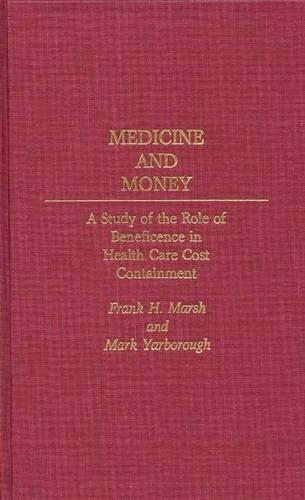
Medicine and Money: A Study of the Role of Beneficence in Health Care Cost Containment
(Hardback)
Publishing Details
Medicine and Money: A Study of the Role of Beneficence in Health Care Cost Containment
By (Author) Frank H. Marsh
By (author) Mark Yarborough
Bloomsbury Publishing PLC
Praeger Publishers Inc
11th June 1990
United States
Classifications
Tertiary Education
Non Fiction
Medical ethics and professional conduct
Emergency services
Charities, voluntary services and philanthropy
174.26
Physical Properties
Hardback
184
Description
Medicine and Money: A Study of the Role of Beneficence in Health Care Cost Containment is a frank discussion of the moral problems associated with the need to control health care costs. The book provides a base for physicians to address these concerns and examines the events leading to America's current health care crisis, diminishing beneficence. After a brief definition of the problem, Frank H. Marsh and Mark Yarborough continue by describing the threat of cost containment and justifying beneficence-based health care system. Special importance is given to Medicine and Money by the lengthy suggestions on implementing beneficence in the health care system. Marsh and Yarborough address the problem of eroding morality and rising cost concerns of our present health care system. They argue that if the central role of beneficence is abandoned, the medical profession will be unable to properly meet the challenge it faces. Medicine and Money divides its argument into two sections. In the first section, the current crisis in health care is examined and a justification for beneficence is given. The second section describes how beneficence can be implemented in the health care system as a means to control health care costs. Medicine and Money is written for every member of the medical and philosophical communities.
Reviews
Marsh and Yarborough argue that the rise of health care consumerism compromises the role of beneficence as the central ethic in the doctor-patient relationship. They believe that beneficence can be an effective means of cost control as well as a crucial component of the moral foundation of the medical profession.-Hasting Center Report
This book's theme is the need to reform medicine internally by returning it to a beneficence-based professional model. The authors begin by analyzing current crises in the cost of medical care, access to medical care, and professional credibility. They find these crises rooted in what they label cost containment' and health policy based on rights and justice.' The harms caused by these approaches are compared to the advantages of a micro approach to health care decision making based on the principle of beneficence. Provocative and interesting book that merits careful reading by advanced undergraduate and graduate students and professionals concerned with health care policy.-Choice
"Marsh and Yarborough argue that the rise of health care consumerism compromises the role of beneficence as the central ethic in the doctor-patient relationship. They believe that beneficence can be an effective means of cost control as well as a crucial component of the moral foundation of the medical profession."-Hasting Center Report
"This book's theme is the need to reform medicine internally by returning it to a beneficence-based professional model. The authors begin by analyzing current crises in the cost of medical care, access to medical care, and professional credibility. They find these crises rooted in what they label cost containment' and health policy based on rights and justice.' The harms caused by these approaches are compared to the advantages of a micro approach to health care decision making based on the principle of beneficence. Provocative and interesting book that merits careful reading by advanced undergraduate and graduate students and professionals concerned with health care policy."-Choice
Author Bio
FRANK H. MARSH is Professor of Medical Ethics and Philosophy at the University of Colorado. He is the author of The Emerging Rights of Children In Treatment for Mental and Catastrophic Illnesses, Punishment and Restitution (Greenwood Press, 1984) and Biology, Crime, and Ethics. MARK YARBOROUGH is Assistant Professor of Philosophy and Preventative Medicine, Program of Medical Ethics, at the University of Colorado.
